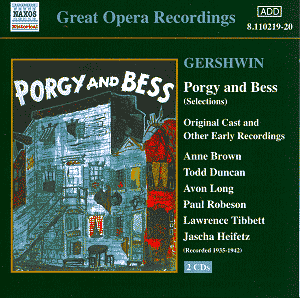When this disc arrived for review I was leafing through
an American Decca 10" set of 78s of Stephen Foster songs arranged
for string quartet and played by the London. Amongst the advertisements
was one for the Heifetz performances included in this Naxos double.
Decca had long been engaged in capturing American music on disc; their
two Jerome Kern album sets were played by the Gordon Quartet and by
the Decca Salon Orchestra conducted by Harry Horlick. Their Gershwin
albums were equally devoted, if somewhat confused discographically.
The earliest recordings here pre-date those Deccas and are the earlier
less well known November 1935 Brunswick coupling by Edward Matthews
and the famous 1935 Victors sung by Lawrence Tibbett and Helen Jepson
with Alexander Smallens conducting (with one small exception where Nathaniel
Shilkret took over). We have then a highlights set from recordings made
during the first decade after the premiere with some spicy extras for
good measure that round out a most enticing collection.
Anne Brown from the 1940-42 Deccas has great and rather
unusual purity of voice, with a vibrato that’s as well sustained as
it is imaginatively deployed; Summertime takes on a crystalline
innocence as a result and her partners, including the excellent Edward
Matthews, prove every bit as compelling. His A Woman is a Sometime
Thing is a stylish, characterful and richly nuanced affair. Todd
Duncan – much admired by Gershwin – gives inter alia I Got Plenty
O’ Nuttin’ – light, jaunty, insouciant. When Duncan and Brown team
up for Bess, You is My Woman Now he is as idiomatically flexible
– if light toned – as she is concentrated of tone. We hear from William
Woolfolk later on – where he lights up the Crab Man’s Call with
fantastic salvos – and the splendid street cries of Helen Dowdy and
Gladys Goode. We wait a long time for the wonderful Avon Long but the
wait is worth it. He injects a real theatrical frisson into There’s
a Boat Dat’s Leavin’ Soon for New York - such colour in his voice,
such flinty insinuation. The Eva Jessye Choir do themselves proud and
Smallens directs admirably. Long was also to make a big showing in the
Decca Song Hits album of 1942 where he was, less than idiomatically,
teamed with the lumbering band of Leo Reisman, a Paul Whitemanesque
outfit with a side-saddle string section. Doubtless they had many a
fine name amongst them – and their massed "blue" fiddle section
writing is at least a change. That said their first trumpet was not
among the immortals with his corny muted solo in It Ain’t Necessarily
So. Long tries hard to lift the stodgy band with him in There’s
a Boat Dat’s Leavin’ Soon for New York but even he can’t do the
impossible. Still the arrangers of I Got Plenty O’ Nuttin’ got
hard to work with some sinuous colouration for a smart-aleck woodwind
orchestration. By strict contrast Edward Matthews fares better in his
accompanists back in the 1935 Decca sides (two tracks only) - I Got
Plenty O’ Nuttin’ and It Ain’t Necessarily So go really well.
The second disc opens with the Saturday Night at the
Met tones of Helen Jepson, who rolls her "r" with stentorian
hauteur and sings Summertime rather as one would ask the maid
to sweep the kitchen. I think ‘ultra-refined’ covers it. Tibbett rolls
in like Boris Godunov employing every ounce of stagecraft to dramatic
effect - the way he sustains breath in I Got Plenty O’ Nuttin’ is
fantastically impressive and his Buzzard Song takes on an almost
Verdian intensity, a genuine paroxysm of a crisis. The mismatch in voices
is apparent from Bess, You is My Woman Now where Jepson is –
not her fault obviously – simply unidiomatic. Robeson is represented
by two 1938 discs that coincided with the London run in which he famously
starred. He’s marvellous of course – but maybe the orchestra under Clifford
Greenwood is a little lacking (apart from the interesting trumpeter
who shows a good appreciation of the finer nuances of the style). Then
there’s the Heifetz selection, a bewitching confection – luscious, gorgeous,
sultry, cocksure, where does one start…His double-stopping in Summertime
is worth the price of admission alone; this is a quarter of an hour
no fiddle fancier should be without. To finish we have the Robert Russell
Bennett arranged Symphonic Picture recorded for Decca in Los Angeles
in 1944. This is Pops territory and a work commissioned by Fritz Reiner.
It is here presented in the slightly cut version – shorn of seven minutes
– in which it first appeared on record to fit 4 x 12" sides.
This is a joyful and - more to the point - historically
important set that collates the Deccas and Brunswicks with great vivacity
and skill. It also gives indications as to performance practices and
priorities in the early days of Porgy and Bess and enshrines
performances of vigour, sensitivity and rich character.
Jonathan Woolf

